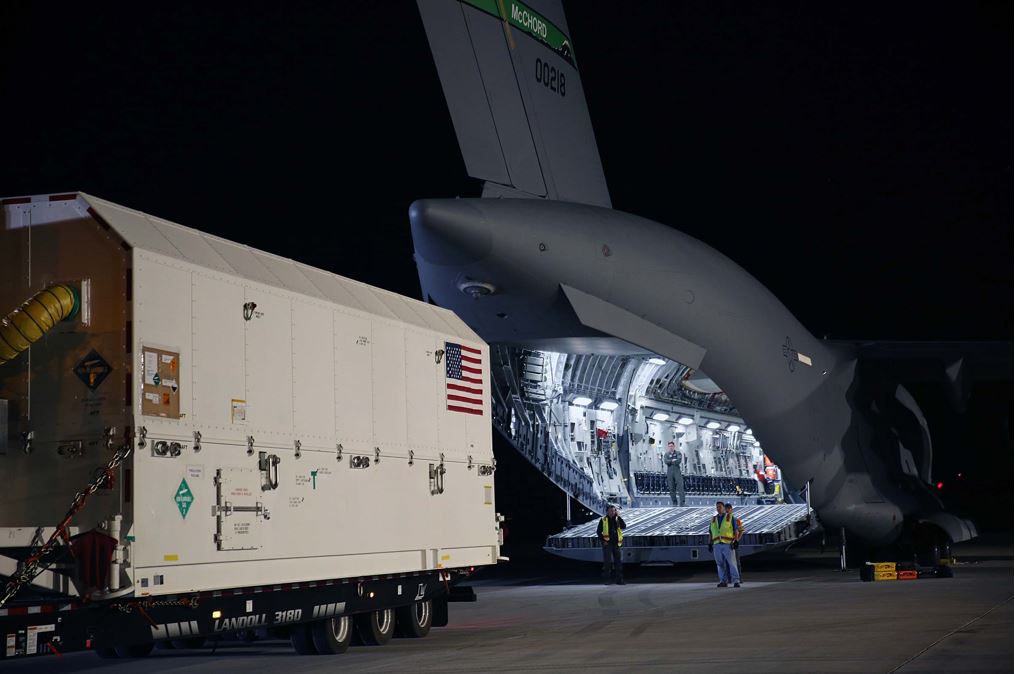After a couple of changes in direction and spending some $18 million to verify the technical chops of their most likely suppliers, defense officials appear ready to buy up to 22 new GPS III spacecraft. Although three firms are now well positioned to bid on the potentially lucrative contract, the Defense Department continues to leave the contracting door ajar for newcomers, just in case.
After a couple of changes in direction and spending some $18 million to verify the technical chops of their most likely suppliers, defense officials appear ready to buy up to 22 new GPS III spacecraft. Although three firms are now well positioned to bid on the potentially lucrative contract, the Defense Department continues to leave the contracting door ajar for newcomers, just in case.
In an April 19 special notice posted on Fed Biz Ops, Air Force Space Command announced the next step in its two-phase selection process — an Industry Day for GPS III bidders on Thursday, May 4, 2017 in El Segundo, Calif.
During the event the Pentagon will share the acquisition strategy it is currently reviewing in order to get feedback from those interested in competing. The Air Force will release a Request for Proposals (RFP) later this calendar year for a fixed-price contract to begin delivering spacecraft in 2025. The winner will be announced late next year according to the posting (Solicitation Number: 17-038).
Likely to bid, of course, are the winners of the three Phase 1 Production Readiness Feasibility Assessment contracts awarded last May. The goal of Phase 1 was to determine if there were "viable, low-risk, high-confidence sources" that could build the new spacecraft, the announcement said. The trio of fixed-price deals, each worth up to $6 million, went to Boeing Network and Space Systems, Lockheed Martin Space Systems Company, and Northrop Grumman Aerospace Systems.
The Air Force chose the two-phase approach after technical issues with the first tranche of spacecraft delayed the program by years. The contractor for the first 10 satellites, Lockheed Martin, ran into internal interference problems in the payload as it tried to add new signals. Then, early in 2016, technical problems arose with the satellite’s capacitors.
"In investigating the capacitor failures, the program discovered the contractor skipped a key developmental step because a subcontractor had not conducted qualification testing for the capacitor’s operational use in GPS III satellites," according to a new report from the Government Accountability Office (GAO). Though design qualification was completed successfully last December, problems with the test set-up invalidated the reliability testing of the production lot from which the failed capacitors originated. "The program decided to assume risk and proceed ‘as is’ with satellite 1," said GAO "despite it being fitted mostly with capacitors from that lot. For satellites 2 and 3, the program ordered replacement of capacitors from the lot."
GAO said the GPS III problems, plus delays in development of the new GPS ground system, have "combined to place the planned March 2018 launch date for the first GPS III satellite at risk."
"The contractor is now projecting deliveries of satellites 1 through 8 will be delayed, on average, by about six months. The Defense Contract Management Agency is projecting an additional delivery delay of nine months, on average, for each satellite beyond what the contractor now forecasts," GAO wrote in Defense Acquisitions: Assessments of Selected Weapon Programs, released in March.
Air Force officials have been quite public about their frustration with Lockheed Martin’s troubles — frustration that helped shape the upcoming contest. In one early iteration the Air Force planned to fund competitors and then have one or more of them compete against Lockheed Martin to build the remaining GPS III spacecraft. That approach was revamped and the firms, including Lockheed Martin, were offered $6 million to help them demonstrate their ability to build the new spacecraft. Though the Air Force ultimately funded Lockheed Martin as well as Boeing, and Northrop, their anger over the delays is likely to factor into the upcoming award decision.
"What’s happening here is that the Air Force is proceeding with plans to compete the next batch of GPS satellites rather than just making it a sole source award to Lockheed," said Todd Harrison, director of the Aerospace Security Project and of defense budget analysis at the Center for Strategic and International Studies. "What they did in Phase 1 is give other companies, specifically Boeing and Northrop, the opportunity to make the case that they could build GPS III satellites. The government determined that these other companies are viable alternative sources, so it is proceeding to compete the next round of satellites. It does not necessarily mean Lockheed will lose the work, but it is not a good sign for an incumbent when the government looks for alternative sources."
That search for alternative sources, the posting suggests, could stretch beyond the three Phase 1 winners.
The industry day announcement makes clear that Phase 2 is not a simple downselect. "Participation in Phase 1," the Air Force wrote, "is not a prerequisite to participation in Phase 2."
"Currently, Phase 2 is planned as a full and open competition," confirmed Air Force spokeswoman Capt. AnnMarie Annicelli. "Participation as a Phase 1 contractor is not required to compete in Phase 2."
Even so, any new entrant likely could be at a significant disadvantage.
"I wouldn’t read too much into it," said Harrison. "Phase 1 just proved the idea that others could build GPS satellites (which should have been obvious anyway). They are leaving it open that another company could bid, but it doesn’t mean that some other company would actually be able to crack into this acquisition. There is still a substantial barrier to entry for building a GPS satellite."




